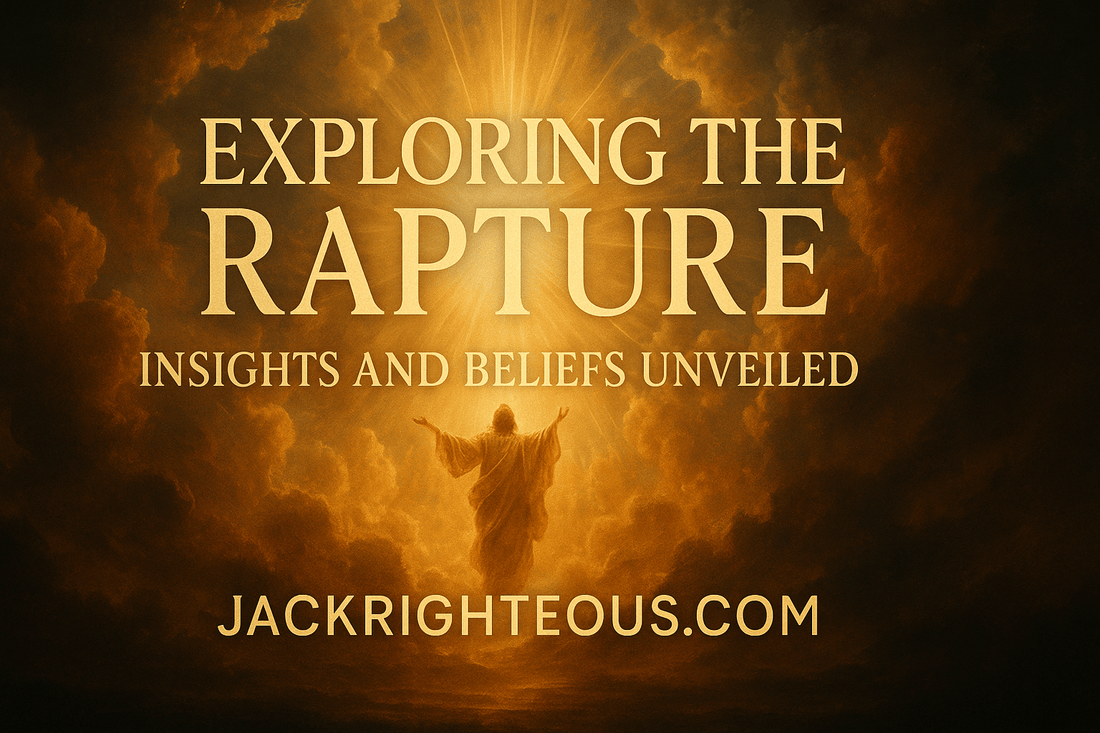
Exploring the Rapture: Insights and Beliefs Unveiled
Gary Whittaker
The Rapture: What It Is, Why It Matters, and What It Means for You
By Jack Righteous
Have you ever wondered about the enigmatic concept of the Rapture, a topic that has sparked both curiosity and debate across various cultures and faiths? In this guide, we're diving into the heart of this fascinating idea, a cornerstone of Christian eschatology that resonates with hope and prophecy. Our goal is to unravel the layers of the Rapture, presenting it in a light that's enlightening for believers and intriguing for the curious. With an open mind and a spirit of exploration, let's embark on a journey to understand this profound concept, regardless of where you stand in the spectrum of belief.
The Rapture Decoded
What exactly is the Rapture? This term, often heard in religious conversations, refers to a future event prophesied in Christian theology where believers are expected to be lifted to meet Christ. This concept is primarily based on passages like 1 Thessalonians 4:16-17, described as a moment when "the dead in Christ will rise first," followed by those who are alive and believe. The Rapture is envisioned as a transformative event, marking a significant point in the narrative of Christian faith. While interpretations vary, the core idea symbolizes hope and renewal. In this exploration, we'll strip away complex theological jargon, aiming to present the Rapture clearly and straightforwardly that speaks to everyone's curiosity.

A Spectrum of Beliefs
In the realm of Christian theology, the Rapture is interpreted through several lenses. The most prominent ones are the pre-tribulation, mid-tribulation, and post-tribulation views. The pre-tribulation perspective posits that the Rapture will occur before a period of great tribulation on Earth, offering believers a means of escape. Mid-tribulationists believe the Rapture will happen midway through this period of hardship, while post-tribulationists argue it will occur after, with believers enduring these trials. Each interpretation stems from different readings and understandings of biblical texts. This diversity highlights the depth and richness of theological study, showcasing how one concept can be seen through multiple prisms of faith and interpretation.
Reading the Signs
One of the intriguing aspects of the Rapture is the signs that are said to precede it. These signs, as described in biblical prophecies, include widespread deception, escalating conflicts among nations, natural disasters, and an increase in persecution of believers. It’s important to understand that these signs are subject to interpretation and are viewed differently within various Christian traditions. Some see them as literal events, while others interpret them more symbolically. This section aims to present these signs objectively, allowing readers to grasp the breadth of perspectives and the significance these signs hold in the narrative of the Rapture.
Separating Fact from Fiction
When discussing the Rapture, it's crucial to distinguish between scriptural teachings and common discussions. One widespread misconception is the certainty of the Rapture's timing. The exact moment of this event is not specified in the Bible, emphasizing the importance of constant readiness rather than prediction. Another discussion involves the Rapture being a visibly dramatic event, while scriptural interpretations vary from a subtle to a more manifest occurrence. By addressing these misconceptions, we aim to clarify the Rapture in its scriptural context, offering a more grounded understanding that respects both faith and reasoned inquiry.
Living with the Promise
The belief in the Rapture is not just about awaiting a future event; it deeply influences the daily lives and ethics of those who hold it dear. It inspires a life of readiness, where values like love, compassion, and integrity are paramount. Regardless of one's stance on its timing or nature, the Rapture encourages introspection and a commitment to living a life that reflects one's beliefs and values. This section isn't about persuasion but understanding how a theological concept can shape everyday actions and attitudes, resonating with a message of hope and purpose.
Scholarly Reflections
As someone who has studied Judeo-Christian eschatology in depth, I’ve been struck by how the Rapture intersects with larger questions of justice and visibility. The real takeaway isn't just *what* might happen, but *why* this belief has persisted. It challenges both believers and skeptics to consider how time, accountability, and divine justice are framed in modern society.
Your Commentary Matters
Here’s what I’ve been reflecting on lately as someone who follows theological developments *and* modern culture:
- Why are some figures publicly prosecuted and others not? The Rapture calls out inequity at its core—why some rise, and others fall. It’s hard not to ask why certain individuals are publicly brought to trial while others, with arguably darker histories, are left alone. Is it about race? Or is it about class and power?
- The legal system and “consent”: In light of current high-profile trials, what does RICO mean when initial participation was “consensual”? Biblical justice often cuts through legal gray zones—God sees motive, not just action.
- Wealth and judgment: Let's be honest—most people without extreme resources would be destroyed in court. Yet Revelation tells us justice doesn’t bend for the rich. What does that mean when money buys freedom now?
These aren't just cultural questions—they’re spiritual ones. And they point to why the idea of the Rapture still strikes a chord today. If you're reading this and wondering how it all connects: it does. The call to be “ready” has never just been about the clouds. It’s been about truth. Ownership. Alignment.
Conclusion
In our exploration of the Rapture, we've journeyed through its basic definition, various interpretations, signs, and common myths, concluding with its practical implications in daily life. This guide aimed to demystify and illuminate a complex theological concept, making it approachable for all. Whether you're a believer, a seeker, or simply curious, understanding the Rapture offers a window into the diverse and rich tapestry of Christian eschatological beliefs. May this exploration inspire you to reflect on the broader implications of such profound beliefs and their role in shaping our perspectives and actions in the world.
Join the Conversation
Alright, let's wrap this up. We've journeyed through the ins and outs of the Rapture—from what it is, to the different ways it's understood, and the signs that get people talking. We even tackled some myths and looked at how this belief touches our everyday lives. Now it's your turn—jump into the comments and let's keep this conversation going. Got questions? Thoughts? Anything that's got you thinking? Share it all. Every voice adds something special to the mix here at JackRighteous.com.
Ready to Launch or Level Up Your AI Music Journey?
-
Start Here – The Suno AI Creator Guide:
https://jackrighteous.com/pages/suno-guide-getting-started -
Learn to Brand with Sound – GET JACKED Into Suno Branding:
https://jackrighteous.com/pages/start-ai-music-branding -
Unlock the Full Anthem Path – GET RIGHTEOUS System Access:
https://jackrighteous.com/pages/get-righteous-anthem-guide
(Requires one of the following:
– Get Jacked Full Pro Kit
– Get Jacked Pro AI Music Kit
– Sanctuary Digital Download)

